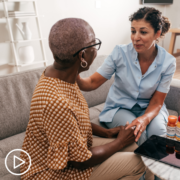How Can Endometrial Cancer Patients Advocate for Better Care?
How Can Endometrial Cancer Patients Advocate for Better Care? from Patient Empowerment Network on Vimeo.
How can endometrial cancer patients empower themselves for better care? Dr. Ebony Hoskins shares advice for patients who feel dismissed or unheard when seeing their care provider.
Dr. Ebony Hoskins is a board-certified gynecologic oncologist at MedStar Washington Hospital Center and assistant professor of Clinical Obstetrics and Gynecology at Georgetown University Medical Center.
[ACT]IVATION TIP
“…seek alternate care or another opinion. I think it’s very important that patients have a doctor that they trust and feel like they can ask questions for. I don’t, I really don’t think it’s okay to be dismissed.”
Download Guide | Descargar Guía en Español
See More from [ACT]IVATED Endometrial Cancer
Related Resources:
Transcript:
Mikki:
Dr. Hoskins, what is your message to women who speak up and their concerns are dismissed and aren’t taken seriously?
Dr. Ebony Hoskins:
Well, Mikki, do you want to know my real answer? I don’t think you do. But I’m going to tell you anyway. So anytime I hear a patient that say they did not feel heard, I always say, “You understand that you can get a different provider, right?” So that also means that if a patient does not have the trust anytime you don’t have trust, you don’t have a relationship, and that it’s okay to find a different provider, or a doctor to make sure that you’re heard. And I have seen women who don’t have any type of gynecologic cancer who have come to my office for a second opinion. And when it, and I say, well, “Why are you here?” And they said, “Well, I was really looking for someone that looked like me that I could trust to tell me, because when I asked these questions, I was dismissed.”
And so I was happy to give the opinion, but really sad that this particular patient had to travel to see someone that they really didn’t need to see, to get an answer that she was actually looking for, and not looking for the wrong answer. She just wasn’t, her question wasn’t being answered. And so I think if you don’t have the trust, there are other providers in our communities and getting those names from either a primary care provider you know, and I always hit or miss on the online thing from family members, friends about doctors that they like or that have a good reputation in terms of listening to their patients.
Mikki:
I also have one patient, I mean not a patient. I have a connect that dealt with this, this right here. And she went to several doctors before she got her diagnosis and which means time had spanned in between that time and her trying to look and saying, “Hey, this is what’s wrong. This is what I’m feeling. I know it can’t be this.” And she’s just going from doctor to doctor. And in between that time she missed some care that she had needed in that time. So what would be your activation tip for someone like that?
Dr. Ebony Hoskins:
I think, just like I said before, seek alternate care or another opinion. I think it’s very important that patients have a doctor that they trust and feel like they can ask questions for. I don’t, I really don’t think it’s okay to be dismissed.
Mikki:
Thank you so much.











